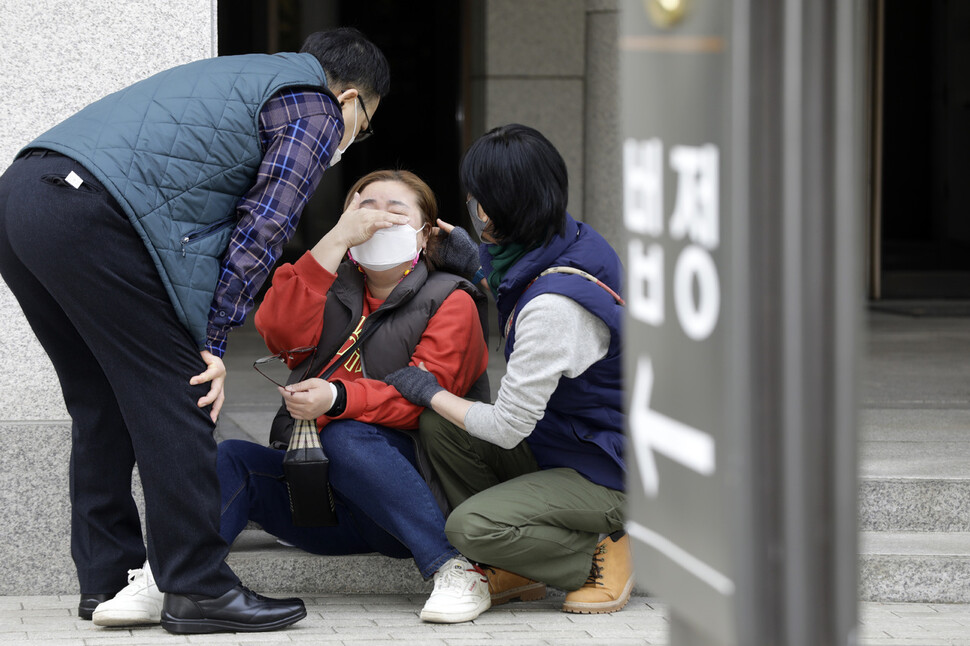In response to the request for an emergency appeal of the director’not guilty of special confinement’
“It does not correspond to the reason for emergency appeal”
Emphasizing national responsibility apart from judicial judgment

An emergency appeal filed by the Prosecutor General, claiming that the late Prosecutor General Park In-geun, who committed confinement, forced labor, and a black burial on the basis of the inclusion of a vagrant, was dismissed in the Supreme Court on the morning of the 11th, at the Supreme Court in Seocho-dong, Seocho-gu, Seoul. Weeping these tears, we are complaining of resentment. By Kim Myung-jin, staff reporter
An emergency appeal filed by the prosecutors’ court to cancel the acquittal of the head of the Busan Brotherhood, who is suspected of illegally imprisoning 3,000 citizens and engaging in forced labor and abuse in the name of leading the vagrants, was dismissed in the Supreme Court. However, the Supreme Court said that it was necessary to investigate the facts at the national level in the case of fraternity assistance. The victims grieved, saying, “The state has abandoned us.” The second part of the Supreme Court (Presiding Judge Ahn Chul-sang) dismissed an emergency appeal on the 11th that the prosecutor general at the time of Moon Moo-il requested that the late Mr. Park In-geun, the former director of the Brotherhood Bokwan, be judged not guilty of special confinement charges in 2018. The emergency appeal system is subject to a final judgment, and is allowed when there is a violation of laws and regulations at a hearing or trial. However, the Supreme Court decided that this case “does not fall under the subject of an emergency appeal.” Park In-geun was prosecuted in 1987 on charges of imprisoning prisoners and embezzling government subsidies. At the time, the Supreme Court sentenced Park to two years and six months in prison for acknowledging that Park’s imprisonment was a party act pursuant to Article 20 of the Criminal Law, and convicted only of embezzlement charges. In 2018, the prosecution made an emergency appeal on the grounds of the innocence, saying that the order of the Ministry of Home Affairs, “Guidelines for reporting, crackdown, expropriation, protection, and return home and follow-up management of vagrants” was unconstitutional and invalid. However, the Supreme Court saw that this case was not subject to emergency appeal judgment. The Supreme Court judged that the basis for Park’s acquittal was not the order of the Ministry of Home Affairs, but Article 20 of the Criminal Code, which states that “actions pursuant to the statute shall not be punished.” The victims of the brothers’ welfare support couldn’t hide their disappointment. Immediately after the sentence, one victim said, “I have been waiting only for today, but the result is dismissal. What should I do now?” he burst into anger. Another victim sat in front of the Supreme Court and cried. Han Jong-sun, a survivor of the brothers’ welfare support, appealed, “We must resolve the resentment even through a thorough investigation by the Truth Reconciliation Committee.” Apart from judicial judgment, the Supreme Court emphasized the state’s responsibility for the case of fraternity support. The judge said, “The core of this case is that the human dignity, which is the highest value of the constitution, is not infringed, but that the human dignity, which is the highest value of the constitution, has been violated.” Attorney Park Joon-young, who represented the victims, said, “The Supreme Court made this judgment in terms of legal stability, but we must also consider the procedure to resolve the victim’s resentment. We need to investigate the facts, as well as to compensate the victims quickly.” On the other hand, in December of last year, the second committee to review the past affairs for truth and reconciliation was launched, but the formal investigation is delayed due to issues such as agreement between the ruling and opposition parties. Chung Geun-sik, chairman of the Truth and Reconciliation Committee, said, “As the Supreme Court confirmed the serious human rights violations of fraternity support, the investigation of the committee became more important.” By Jang Ye-ji, reporter [email protected] ‘
